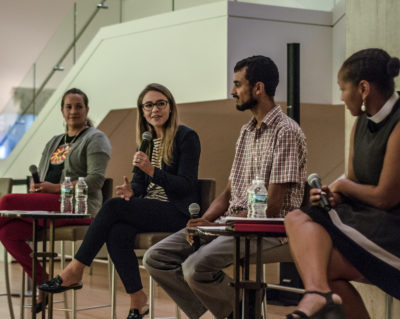
At the first of three public forums in this year’s Museum of Fine Arts City Talks series, 50 people gathered Wednesday night to discuss climate change and the effects it has in Boston.
The MFA’s City Talks series began in 2016, Justina Crawford, the manager of lectures, courses and concerts at the MFA, said. The goal of these talks is to encourage the Boston community to engage in conversation about cultural, social and political issues within the city that tie into current exhibitions, according to the MFA’s official site.
Wednesday’s forum revolved around climate change in Boston, and tied into the “Follow the North Star” exhibition at the MFA, which is about the Inuit people, their culture and how climate change affects their traditional way of life, Crawford said.
“We’re talking about climate change specifically in Boston, but I think that largely or broadly these are some of the topics that Inuit communities are dealing with, whether it pertains to family or sustainability,” Crawford said. “Having all voices be a part, but specifically trying to think about the different sectors of Boston and having them represented.”
Mariama White-Hammond, the associate minister for ecological justice at Bethel African Methodist Episcopal Church and the moderator for the forum, said climate change is a fundamental problem that requires large-scale change in order to address.
“There is a root problem that is old, but viruses unchecked continue to grow and when some people were getting sick I think the tendency was to believe something is wrong in those people but now people are going, ‘Oh wait maybe there was something wrong on a more fundamental level,’” White-Hammond said. “To address climate change, we are talking about a radically transformed world.”
Adi Nochur, a program manager at WalkBoston, said during the forum that climate change is an issue that is expansive and requires a lot of different people to confront and challenge it.
“Addressing climate change is such a multifaceted struggle where we expend our energy,” Nochur said. “We need people who are going to be working on all of those different front lines and lending their skills and capacities in whatever unique way they can contribute. We need to recognize on a local level we can tangible progress we are able to make victories on a local level.”
Nochur said forums like this are important to show people that they can come together to tackle big systematic issues like climate change.
“Really being able to give people a sense of how they can come together and get involved and take action on these issues … [is] going to make us think about our practices moving forward,” Nochur said. “It’s important to create spaces like these for dialogue.”
Jill Valdes Horwood, the director of policy at Boston Harbor Now, said in the forum it’s important to include all citizens in the conversation about climate change.
“Climate change is something that’s affecting everyone equally. We are all part of this world and so what’s really important is that we’re listening to the voices that don’t necessarily have the time or the power,” Valdes Horwood said. “One voice really does makes a difference because your climate change experience is completely different from the person sitting next to you and it matters and it adds to the conversation.”
Several attendees said climate change is an issue that is a major problem and starting to work on this in Boston is important.
Joyce DiBona, 76, of South End, said after the recent irregular weather patterns, she wanted learn more about how the changing climate will continue to affect Boston.
“After all the recent hurricanes and other issues, especially living in Boston which is right on the ocean … maybe I’ll learn something new,” DiBona said.
Elaine King, 59, of Fenway, said climate change is the result of a lot of smaller issues and addressing these small problems can make a huge difference when dealing with climate change.
“I want hear what people have to say about the resolve instead of what the problem is,” King said. “We really need to start looking at solutions in seemingly the smallest things.”
Forrest Perkins, 23, a senior at Northeastern University in the School of Architecture, said, in light of recent weather patterns, more people need to talk about climate change.
“I mean you can just look at what happened in Houston, Puerto Rico, Florida even,” Perkins said. “It’s a pretty big deal that needs to be talked about more.”

















































































































